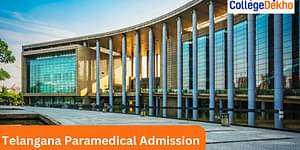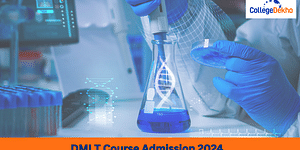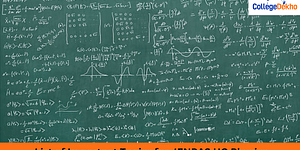BMLT Course - Bachelor of Medical Laboratory Technology Syllabus & Subjects 2025
BMLT Syllabus & Subjects Overview
Bachelor of Medical Laboratory Technology or BMLT course is a 3-year-long undergraduate program that prepares students to build a successful profession in the field of medical laboratory technology. BMLT syllabus provides a thorough understanding of laboratory science and technology in addition to the practical abilities required to work in a medical lab.
Students gain knowledge in a variety of BMLT subjects and topics, including Hematology, Clinical Biochemistry, Microbiology, Immunology, and Transfusion Medicine. They also acquire critical abilities like Quality Assurance, Management, and Research Methodology in the Laboratory.
Table of Contents
BMLT Syllabus: Core & Elective
BMLT Syllabus has both core and elective subjects. Core subjects are the ones that need to be compulsorily studied while pursuing the course while electives are the ones that students can select based on their individual interests. Check out the BMLT core subject and BMLT elective subjects here:
BMLT Core Subjects
The course subjects of the Bachelor of Medical Laboratory Technology are :
- Human Physiology
- Human Anatomy
- Biochemistry
- Pathology
- Histopathology
- Immunology
- Serology
BMLT Elective Subjects
The elective subjects included in the BMLT course are :
- Nuclear Medicine Technology
- Medical Technology
- Medical Lab Technology
BMLT Course Structure
The course structure of BMLT is provided below:
- Six Semesters
- Core Subjects
- Elective Subjects
- Practical Workshops
- Research Projects
- Thesis Submission
BMLT Syllabus: Year-Wise
The yearly BMLT syllabus in the course remains more or less the same in most of the colleges in India. Here are the year-wise BMLT subjects that students encounter while pursuing the course.
| BMLT 1st Year Syllabus | |
|---|---|
| Terminology and General Plan of the Body | Cardiovascular System |
| Special Senses | Musculoskeletal System |
| Nervous System | Endocrine System |
| Digestive System | Genitourinary System |
| Respiratory System | – |
| BMLT 2nd Year Syllabus | |
| Introduction and History of Pathology | Complete Blood Count |
| Introduction to Immunohematology | Protein-Energy Malfunction |
| General Features of Acute and Chronic Inflammation | Mechanism of Coagulation |
| Tissue Renewal and Repair | Haemoglobin |
| Cancer | – |
| BMLT 3rd Year Syllabus | |
| Staining of Carbohydrates | Demonstration of Nucleic Acids |
| Basic Principles of Blood Banking | Immunohistochemistry |
| Other Blood Group systems such as Lewi | Apheresis |
| Demonstration of Minerals and Pigments in the Tissue Sample | Transfusion Transmissible Infectious Disease Screen |
| Autoimmune Disorders | Blood Components and their Preparation |
BMLT Syllabus for Distance Learning Programmes
Distance Education is available for BMLT subjects if someone intends to choose this route. The curriculum remains the same and the students get to learn as much as they get through the courses. The expertise needed in Laboratory Technology is taught at a deep level to help the students become skilled in the field. The skills that the students learn from the programme can be used to work and collaborate in advanced Medical Technology Labs.
The Admission Process:
Any distance programme offered in BMLT is done on the basis of merit and how deserving the candidate is. It is compulsory for the student to possess the certificate of completion for Class 12. Moreover, students can get access to the course even if they possess a related diploma in any such related field. One should realise that the concept of entrance exams is not really viable when it comes to BMLT admissions. One could consider going with IGNOU for a renowned distance learning programme in BMLT.
Best Books for BMLT Syllabus
Students follow a wide range of books during the course and listed below are some books that are highly referred to:
| Books | Authors |
|---|---|
| Molecular Cell Biology | H Lodish |
| Principles of Biochemistry | Lehninger, Cox, and Nelson |
| A book of Biostatistics (BMLT) | Vinod Kumar Bais |
| A textbook of Microbiology (Theory cum Practical) | Imtiyaz Wani |
| Chemical Process Principles | Ragatz, Hougen, and Watson |
FAQs about BMLT Syllabus
What are the components of the BMLT syllabus?
The components of BMLT syllabus are core subjects, elective subjects, practical workshops and research projects.
What are the core BMLT subjects?
Some of the core BMLT subjects are- Human Physiology, Human Anatomy, Biochemistry, Pathology, Histopathology, Immunology and Serology among others.
Does the BMLT syllabus have Serology?
Yes, BMLT syllabus has multiple subjects including Serology. It is a scientific study of serum and the antibodies present in it.
Is Histopathology a part of BMLT syllabus?
Yes, Histopathology is one of the core subjects that is a part of BMLT syllabus. It deals with the in-depth study of the diseases of the tissues,and the diagnosis of the aforementioned diseases.














